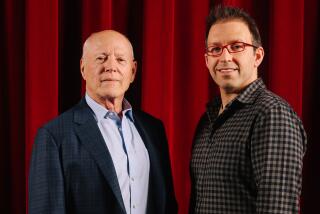‘Gentleman Magician’ Reappears
- Share via
Lee Grabel, the dean of American magicians, once won “oohs” and “aahs” from city sophisticates and country bumpkins alike with his famous Floating Piano trick--levitating an upright piano and the girl playing it, topped off with a midair somersault.
But in 1959, Grabel, with his wife and stage assistant Helene, retired from public life and, except for a brief 1977 “nostalgia tour,” the couple has lived far from the spotlight in Alamo, a small town in Contra Costa County.
Now, like the rabbit out of the hat, Grabel has reappeared to charm audiences with his magical powers and gentle humor. Floating pianos, vanishing horses and levitating ladies aren’t part of the act anymore, but there are still plenty of tricks up this magician’s well-pressed sleeve.
Grabel brings his current cross-country tour tonight to the Orange Coast College Fine Arts Theatre in Costa Mesa.
During a recent interview, Grabel showed why his fans called him the “gentleman magician.” At 68, he is still every inch the elegant showman. Gracious and soft-spoken, Grabel still has that million-dollar grin and conspirator’s wink that melted the ladies’ hearts in the ‘30s, ‘40s and ‘50s.
Grabel said his current show, “Do Not Believe All You See or Hear,” is actually a new twist on an old theme, combining the best of his sleight-of-hand deceptions with a lighthearted lecture on the “psychology of deception.”
“This is an updated version of the show I did in the early 1940s,” Grabel said. “We took it on the road from 1939 to 1942 to colleges across the country, with terrific response.”
A lecture on the “psychology of deception?” Does Grabel break magicians’ time-honored “code of silence” by revealing the tricks of the trade?
“No, I don’t give away the secrets to my tricks per se,” he said, laughing. “Instead, I tell my audiences about the psychology that makes the trick effective, so at the end of the evening, they’ve not only enjoyed good theater, they’ve learned how to be a little more aware of the deception that takes place in the world around them.”
Grabel’s show used to depend on somersaulting pianos or other fancy illusions. Today, he captivates audiences with simpler techniques, such as disappearing canaries, silver dollars pulled out of the air (and the hats, hair and noses of unsuspecting volunteers) and smashed wristwatches that are magically reconstructed with a wave of his hand.
“Apparatus is unimportant in the psychology of deception. Our show doesn’t depend on mechanics,” Grabel said. “Through these simpler tricks, I’m demonstrating the basic principles of deception, which were not created by the magician, but by mankind. They’re as old as Eden.
“My tricks show that people’s senses can be deceived. So I encourage my audience to question their senses, to not let their decisions be easily swayed by advertisements, politicians and the rest,” he said.
Grabel faced his first audience as a professional magician at age 12, performing a one-hour show for the Boy Scouts. At 15, in the depths of the Great Depression, he earned a princely $25 per week performing for schools throughout his hometown of Portland, Ore.
Grabel’s gentle Naderism began more than 45 years ago, when he launched the original tour of the performance-lecture series. In 1942, after nearly three years touring campuses across the West, Grabel traded the ivy-covered walls for a stint with the Army, entertaining troops and organizing shows in the United States and South Pacific.
After his original college tours and his stint in the military, Grabel established himself as one of the nation’s top magicians, building his show into the extravaganza that was to win so much attention in the 1950s. When the great Harry Blackstone Sr. retired, Grabel’s peers named him America’s No. 1 Magician.
Publicity clips from the ‘50s show a younger but no less polished Grabel looking natty in white tie and tails, grinning sweetly as he shoots Helene out of a cannon. Glowing headlines proclaimed: “Grabel Bewilders Audience . . . Crowds Sit Bugeyed” and “It Can’t Happen But It Did at Great Grabel Show.” Even Variety said: “Lee Grabel . . . America’s Foremost Illusionist.”
Tonight’s show at OCC wraps a nine-week circuit that has taken the performer through Arizona, New Mexico, Texas, Oklahoma, Tennessee, Arkansas, Alabama, Louisiana and California. He’ll complete his tour with a show for the National Assn. of Campus Activities conference in Los Angeles and a TV taping in Bakersfield.
These days, a few small traveling trunks have replaced the 20 tons of equipment that used to make up the Grabel show. Instead of an 18-wheeler, Lee and Helene travel between towns in a modified Lincoln. Definitely no room for the vanishing horse and the piano.
But in this age of MTV, does Grabel find it any harder to impress his audiences?
“We’ve found we had to make certain adjustments in the show,” Grabel admitted. “Television has changed us to a certain extent. Now we not only have to compete with it for audiences, we have to pace the show accordingly. There’s a certain something in television that has made the world go a little faster.
“It’s a kind of intensity that makes you feel like you’re being physically pushed down hill. But audiences are used to that, so I’ve snapped up the pace quite a bit. I think the show has its own special kind of appeal now.”
(Lee Grabel will perform tonight at 8 in Orange Coast College’s Fine Arts Theatre, 2701 Fairview Road, Costa Mesa. Tickets are $5 in advance, $6 at the door. Call 432-5880 for tickets and information.)
More to Read
Sign up for Essential California
The most important California stories and recommendations in your inbox every morning.
You may occasionally receive promotional content from the Los Angeles Times.










